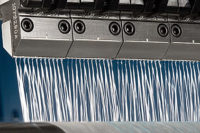Bonding Natural Baby Product Materials with Hot-Melt Adhesives
Accuracy and high performance are critical when bonding natural materials to form disposable absorbent hygiene products such as diapers.


For new machinery, the specification of adhesive bonding systems should be preferred if the producer wishes to be a part of the trend to more natural ingredients.

Figure 1. Price per count of sampled baby diapers.
(Note: Size 4 baby diapers; online pricing at Target.com, Walmart.com, and Amazon.com as of September 2020.)



Plant-based,” “premium cotton,” and “natural” claims are appealing to today’s parents: millennials. Millennial parents are demanding that brands provide “free and clear” products for their personal and families’ use.
Price Hanna Consultants dedicated an entire study on diapers for millennial parents, assigning four profiles to the parents: savvy, premium, name brand, and green. According to this study, the premium shopper “wants to feel they are choosing the best quality, best performing, best looking, most ethical, most responsible choice for their baby.”
Millennials have proven to be more Earth-conscious and are therefore more concerned with the ingredients inside the products they purchase. That same mindset is being applied to their parenting and what they want their children to be exposed to; this is what’s fueling the market shift to baby diapers, pants, and other baby products that claim significant “natural” ingredient content.
The natural trend has progressed from niche to mainstream. In 2018, industry leader Procter & Gamble launched the Pampers Pure Collection, which includes premium cotton diapers. The following summer, Kimberly-Clark released Huggies Special Delivery, which includes ultra-premium diapers with plant-based claims. Major retailers such as Walmart (Hello Bello) and Amazon (Earth & Eden) have also begun to sell diapers positioned to the Earth-conscious, premium shopper.
“We know that parents are looking for more and more natural ingredients, but they don’t want to sacrifice performance and softness,” said Sarah Inbau, brand manager for Huggies North America. “We developed Huggies Special Delivery to combine the three attributes we know parents want: superior performance, more plant-based fibers, and of course, the softest touch on baby’s skin.”
Millennial parents want the most ethical and responsible choice for their baby, and they’re willing to pay more to get it. According to a sampling of a few traditional and natural brands marketed online, those with a natural claim have an average selling price of $0.45 per diaper, about twice that of “traditional diapers” (see Figure 1). Most parents in the online reviews of the sample brands chose the natural diapers because their babies have sensitive skin, and they want a highly absorbent diaper; the diapers being natural is a huge plus as well. This growing preference represents an opportunity for producers to increase market share and grow profit.
The Need for Adhesive Bonding
When considering adding new products or modifying existing offerings with natural substrates, it’s crucial to keep in mind that such substrates cannot handle melting as a form of bonding. Since melting requires the substrate to have a melting point, and natural substrates do not, this precludes the use of bonding techniques that entail “welding” or localized melting of the substrates.
Adhesive bonding, however, is compatible with numerous substrates, including natural options such as cotton. Bonding with adhesive does not require the substrates to have a melting point. Hot-melt adhesive creates a bond through adhesion in a molten state to the two substrates, thus creating the intermediate bond between the substrates (vs. melting the substrates to one another).
Fortunately, the vast majority of the installed base of production assets use tried-and-true adhesive bonding, and thus the introduction or expansion of natural ingredients is simplified. For new machinery, the specification of adhesive bonding systems should be preferred if the producer wishes to be a part of the trend to more natural ingredients.
Optimizing Performance
When bonding natural materials to form disposable absorbent hygiene products, accuracy and high performance are critical. High-speed dispensing applicators can provide customers with exceptional performance, flexibility, serviceability, and cost of ownership.*
Adhesive applicators can sustain consistent adhesive patterns while keeping up with high production speeds in challenging applications such as manufacturing baby diapers and pants, feminine napkins and liners, and adult incontinence briefs. Spray nozzles also play an important role by providing pattern options that deliver uniform bonding and soft product features that are especially important in baby diaper applications.**
Manufacturers in the hygiene sector that are using hot-melt adhesive dispensing systems would do well to consider joining the trend of producing natural diapers. Existing adhesive dispensing systems can easily integrate into production lines, thereby minimizing investment.
For more information, contact the author at (770) 497-3455 or alan.ramspeck@nordson.com, or visit http://adhesives.nordson.com/en-us/nonwovens.
*Trio™ Variable Dispense Applicator from Nordson.
**Rhythm™ spray nozzles from Nordson.
Looking for a reprint of this article?
From high-res PDFs to custom plaques, order your copy today!








